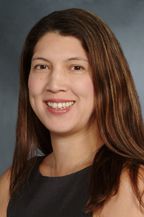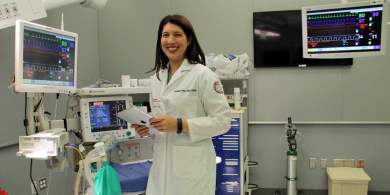Why 121 years is too long to wait for gender parity in surgery
Heather Yeo, M.D., MPH, recently penned a piece for the Womanthology blog. Read the full article here.
The privilege of taking care of patients is one that my parents instilled in me. My father, a community general surgeon, passed away 12 years ago this past May – just weeks before I started my surgery residency. I was inspired by the impact he made on his patients and how he changed their lives. My mother, a nurse, is one of the kindest people I have ever met. Together I have learned from them and become a physician interested not only in making a difference for my individual patients, but on a larger scale. I am proud of what I have accomplished and look forward to becoming a leader in the field of surgical oncology and colon and rectal oncology, and I’m honoured to be able to care for these complex patients.
I did not always know that I wanted to go into surgery, and in fact my undergraduate major was from Georgetown’s School of Foreign Service, with a focus on science and technology in international affairs. After taking some science classes, I decided that I wanted to go into medicine, so I switched gears a little bit after I graduated, and I went back to school and took premed courses.
I liked surgery because it is a very direct way to help people and because of the relationship you build with your patients. That is one of the reasons my focus is on colon cancer; a disease that can only be cured with the help of surgery, but one where patients often have good survival.
A day in the life of a surgeon
I’m very lucky. I work with a great team of surgeons (men and women), nurses and support staff. Every day I spend some time on patient care, I operate around one day a week and cover emergency surgery one day a week. I also spend time a large portion of my time researching ways to improve the way that we care for surgical patients.
I have a joint appointment in our Department of Healthcare Policy and Research, where I spend time as a health services researcher studying surgical outcomes. I am also working with Cornell’s Tech campus to develop post-operative patient tracking apps. Days are long and busy, but usually go by quickly because of this, usually starting at 6 a.m. with morning rounds, followed by meetings, then surgery, clinic or research. And as a working mom, my evenings are devoted to my kids (until they fall asleep) and I often work again once they are asleep for the night.
The Association of Women Surgeons – an important source of support for female surgeons around the world
I initially joined the Association of Women Surgeons because of the grant opportunities that they offer. After that I learned about other resources through the AWS and became more involved in both our local medical student group and on a national level.
AWS’s goal is to help women surgeons engage, empower and excel. They offer mentorship, resources, and a community of women surgeons to help those all along the pipeline of training (from medical students to department chairs).
In addition, AWS is involved internationally helping promote and support those in other countries where women are often not given opportunities. AWS is active politically and working to support policies that help engender equality. For example we support pay parity for women surgeons, and parental leave.
The Association of Women Surgeons was founded in 1981 when Patricia Numann, MD, FACS, invited as many women surgeons as she could identify to breakfast at the October meeting of the American College of Surgeons. Over the past 35 years AWS has grown from a mere handful of women who met informally once a year to an internationally recognized organization with members in over 15 countries.
Gender balance in surgery: 121 years and counting
Women are still outnumbered in surgery. While medical schools are near 50% women, further along the pipeline of surgical training women are much more underrepresented. At the highest levels of academic surgery (full professors), based on the current rate of increase, we estimated in our recent paper published in the American Journal of Surgery that it will take women 121 years to reach gender parity. Some strides have been made recently, as now there are 17 female chairs of departments of surgery, many more than in the past.
The importance of male champions
Male champions are making a huge difference. By supporting and promoting women, our champions who are in power help us to get into power and enable our careers. Dr. Jeff Milsom, the chief of our division, is an innovator and wants to have innovative people around him, and he is willing to take risks to change the way that we care for patients. I find working with him inspiring.
Also, our chairman of surgery, Dr. Fabrizio Michelassi, has been a strong supporter of women surgeons and a diverse work force, even starting a diversity lecture series. He was awarded the Past Presidents’ Award this year at the AWS Annual Meeting, which is given to a surgeon who does a lot to support women surgeons and diversity. Our department has focused on learning the importance of unconscious bias.
Advice for other girls and women interested in surgical careers
My advice for other girls and women interested in surgery is to know that whilst it is hard and there are challenges all along the way, there are people at each point who are willing to help you. I would say that no one can do it alone.
I have a very supportive husband and family, mentors and colleagues all who have helped me along the way. The job is rewarding beyond belief, and the privilege of taking care of and operating on patients is really unlike anything else.




